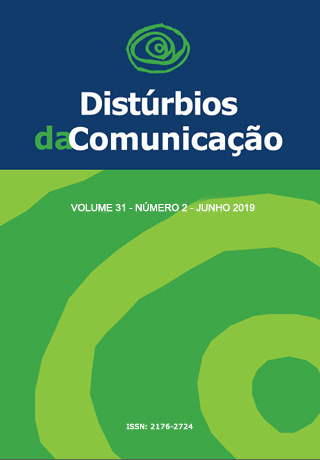Elderly people’s self-perception about their hearing conditions, their listening and their communication strategies
DOI:
https://doi.org/10.23925/2176-2724.2019v31i2p317-327Keywords:
Elderly, Hearing, Speech, Language and Hearing Sciences, Communication, Language.Abstract
Introduction: Recent studies in the area of Speech Language Therapy have considered aging in addition to organic aspects, based on social participation and autonomy of the elderly person. In this sense, it is necessary to emphasize the role of language, conceived as a dialogic activity, in the promotion of active aging, which depends on the possibility of listening and being listened to. Objective: To investigate the self-perception of the elderly regarding their hearing conditions, their listening and their communication strategies. Method: Based on the dialogical analysis of the discourse, a semi-structured interview was conducted with seven elderly people, with and without hearing loss, participants of a Language Workshop that took place in a University located in Southern Brazil during the year 2016. Results: The statements produced by the participants show that the elderly use strategies for better listening, such as getting closer to the speaker, looking straight ahead and paying attention to the other. Regarding the self-perception of listening, some elderly people relate the fact that they do not listen to negative experiences in childhood and their years at school. Conclusion: The possibility or difficulty to listen, in the participants’ perception, distances itself from explanations of organic character and indicates the importance of valorization and acceptance to the singular word of the other. Thus, this perception can serve as a reference to other professionals who work with the elderly, so that they can act, considering each elderly and their discursive productions as unique. This change of look can favor the autonomy, the quality of life and the social insertion of this part of the population.Downloads
Downloads
Published
Issue
Section
License
Copyright (c) 2019 Rayssa Thayana Golinelli, Giselle Massi, Simone Krüger, Israel Bispo dos Santos, Adriele Barbosa Paisca, Ana Paula Berberian, Rita Tonocchi, Ana Cristina Guarinello

This work is licensed under a Creative Commons Attribution 4.0 International License.









